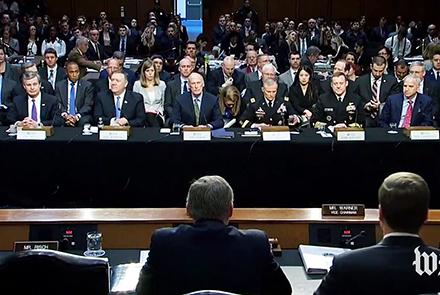In their annual report, six US intelligence agencies stated that Pakistan has pursued its extended nuclear arsenal, continued to support the Taliban, Haqqani network and other terrorist organizations and has limited its cooperation with Washington in the fight against terrorism by forging ties with China - factors the US believes to be threatening to their interests in Afghanistan.
The report has suggested that this year the situation in Afghanistan could further deteriorate. However, in the report it has been said that the insurgents will not be able to take over any key areas.
While delivering their annual report before the US senate members in Washington, officials from the six US intelligence agencies briefed the senators about global threats.
“Pakistani military leaders continue to walk a delicate line, ongoing Pakistani military operations against the Taliban and associated groups probably reflected the desire to appear more proactive and more responsive to our request for more actions against these groups, however actions taken thus far reflect a significant escalation of pressure against these groups,” said Coats.
“Afghan national security forces face an steady performance, but with coalition support, probably they will maintain control of most major population centers, complicating the Afghanistan situation however is our assessment that Pakistan-based military groups continue to take advantage of their safe havens to conduct attacks in India, in Afghanistan including US interests there,” added Coats.
“In Afghanistan a string of terrorist attacks in Kabul left a 150 dead last month suggesting to me that after 16 years of war the insurgency is nowhere near folding and the government remains hard-pressed to provide the security needed for its own people. I particularly value your unvarnished opinion of where progress is being made in Afghanistan and where it is not,” said Richard Burr, Chairman of the US Senate Select Committee on Intelligence.
Meanwhile, there are reports that the United States has put forward a motion to place Pakistan on a global terrorist-financing watchlist.
Reuters reported that Pakistan has been scrambling in recent months to avert being added to a list of countries deemed non-compliant with terrorist financing regulations by the Financial Action Task Force (FATF), a measure that officials fear could hurt its economy.
Pakistan’s de facto finance minister, Miftah Ismail, told Reuters that the United States and Britain put forward the motion several weeks ago, and later persuaded France and Germany to co-sponsor it.
“We are now working with the US, UK, Germany and France for the nomination to be withdrawn,” Ismail was quoted by Reuters as saying. “We are also quite hopeful that even if the US did not withdraw the nomination that we will prevail and not be put on the watchlist.”
If the motion against Pakistan becomes successful, foreign investments in Pakistan will decline and Pakistan will not be able to apply for loans from other countries and international organizations.


